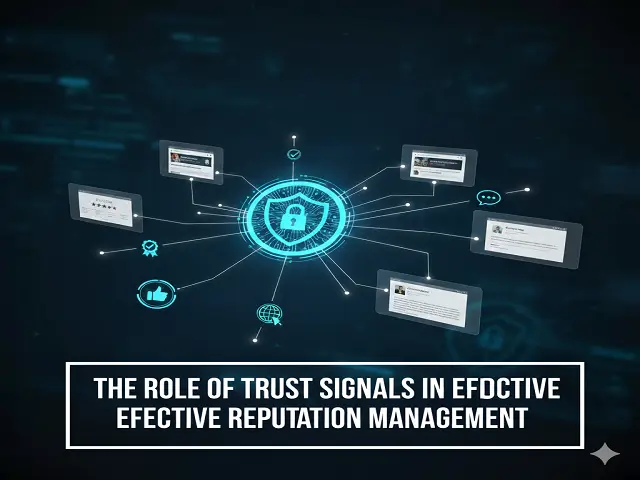~ Trust signals such as reviews, testimonials, and certifications play a crucial role in shaping consumer confidence and brand credibility. Effective online reputation management uses these signals to build trust, improve visibility, and foster long-term loyalty.
With online research shaping most purchase decisions, a brand’s credibility is closely tied to the trust it inspires. People no longer just buy products or services; they invest in trust. That’s why building and maintaining this trust through online reputation management has become a necessity, not an option. A single negative review, misleading article, or poor social media interaction can sway public opinion dramatically. Trust signals play a critical role in countering such challenges, helping businesses maintain authenticity and confidence in the eyes of their audience.
What Are Trust Signals?
Trust signals are cues, often subtle, that reassure consumers of a brand’s reliability, competence, and integrity. They can take many forms: positive customer reviews, verified profiles, security badges, certifications, testimonials, or even professional content that demonstrates authority. Each trust signal validates a brand’s credibility and assures potential customers that they are making the right choice.
When integrated into reputation management strategies, these signals work as powerful tools to reduce skepticism and foster loyalty. In an online ecosystem where consumers are bombarded with endless choices, trust signals act like guiding lights, making one brand stand out over another.
Why Trust Signals Matter in Reputation Management
The internet has given consumers unparalleled access to information. They can compare businesses, read user feedback, and even scrutinize how a company responds to criticism. While this transparency is beneficial, it also makes businesses vulnerable to reputation risks. Here is where trust signals make a significant impact:
- Building Consumer Confidence – A company with strong, visible signals such as verified Google reviews or third-party certifications appears more reliable than one without them.
- Differentiation from Competitors – In competitive markets, trust signals highlight why your brand deserves attention.
- Crisis Mitigation – During a reputation crisis, reinforcing positive signals like authentic testimonials and transparent communication can restore credibility faster.
Without trust signals, even the best online reputation management strategies can fall flat. People don’t just want to hear that you’re trustworthy—they want evidence.
Key Types of Trust Signals in Digital Reputation
To build a credible online image, businesses should incorporate a variety of signals into their strategy. Some of the most effective ones include:
- Customer Reviews and Ratings: Verified reviews on platforms such as Google, Yelp, or Trustpilot are some of the strongest signals of authenticity.
- Testimonials and Case Studies: Sharing real success stories helps audiences relate to a brand and see proven outcomes.
- Social Proof: High engagement on social platforms, influencer endorsements, and visible brand interactions with customers create a sense of reliability.
- Certifications and Awards: Industry-specific accreditations act as credibility boosters and distinguish businesses from less reliable competitors.
- Website Security: HTTPS, trust badges, and secure payment gateways all reassure customers that their data is safe.
By weaving these elements into their social media reputation management and digital strategies, businesses can create a well-rounded online presence that radiates trust.
Trust Signals and Search Visibility
Trust signals don’t only build credibility; they also influence visibility. Search engines consider them as ranking factors when determining which brands deserve higher visibility. Positive reviews, quality backlinks, and strong brand mentions all contribute to higher search rankings. This is why businesses often partner with an online reputation management firm or an SEO agency in Melbourne to align reputation strategies with search engine optimization.
When SEO and reputation management work hand in hand, businesses not only maintain trust but also secure long-term growth. Appearing on the first page of search results with positive signals reinforces consumer confidence before they even click through.
The Role of Social Media in Trust Building
Social media has redefined how businesses and customers interact. Platforms like Instagram, LinkedIn, and Twitter provide opportunities for direct engagement, making them vital for reputation efforts. However, this visibility also means that mistakes are amplified quickly.
Strong social media reputation management ensures that trust signals—such as customer shout-outs, transparent responses, and community engagement—are consistently showcased. This not only humanizes a brand but also demonstrates accountability, a key factor in building trust.
How Businesses Can Strengthen Trust Signals
Here are practical ways companies can enhance their trust signals to achieve the best online reputation management results:
- Encourage Reviews Proactively – Ask satisfied customers to leave reviews and make the process easy.
- Respond Professionally – Address both positive and negative feedback with empathy and transparency.
- Highlight Expertise – Publish thought leadership articles, case studies, and whitepapers to showcase authority.
- Ensure Transparency – Be clear about business practices, pricing, and policies to prevent skepticism.
- Invest in Visual Proof – Share behind-the-scenes content, team stories, or real customer experiences to humanize the brand.
Common Mistakes to Avoid
While building trust signals, businesses must avoid overpromising, faking testimonials, or neglecting negative feedback. Consumers today are quick to spot inauthenticity, and such missteps can cause irreversible damage. An effective strategy balances positive reinforcement with honest acknowledgment of shortcomings, creating a brand that feels both trustworthy and relatable.
Looking Ahead: Trust as the Cornerstone of Reputation
As digital interactions become the norm, trust will continue to serve as the cornerstone of brand reputation. The brands that thrive will be those that integrate trust signals into every aspect of their customer journey. From the first Google search to the post-purchase experience, every interaction matters.
Reputation management is no longer just about damage control—it is about proactively building trust. Trust signals such as reviews, testimonials, and transparent interactions assure consumers that a business is dependable and customer-focused. Amid growing consumer skepticism, brands that emphasize authentic trust signals not only reduce the risk of negative publicity but also nurture long-term loyalty. By combining strategic trust-building efforts with digital visibility tools, businesses can create an online image that inspires confidence and stands strong in competitive markets.




